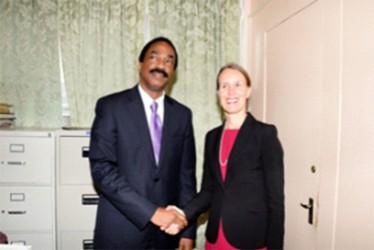Guyana will benefit from a grant of CDN$750,000 to fund legislative drafting and training for judges and lawyers as part of a project to develop its justice system.
The grant was among the issues that were discussed when Canadian High Commissioner to Guyana Dr. Nicole Giles recently paid a courtesy call on the new Attorney-General (AG) Basil Williams at the AG’s Chambers, Carmichael Street, Georgetown.
According to a Government Information Agency (GINA) report, Williams said the courtesy call entailed discussions on areas in which Canada can assist Guyana. In addition to the grant, they also discussed the Anti-Money Laundering and Countering the Financing of Terrorism Bill.

GINA noted that the funds from the grant will be spent on legislative drafting, improving the administrative department of the courts and training for lawyers and judges, among other things.
Giles stated that the money is a part of a project with the Justice Education Society of British Columbia, which is a Canadian Non Governmental Organisation that aims at strengthening the justice system.
She said Guyana was selected as a beneficiary because “we believe in Guyana, there are strong opportunities to make a difference to improve the justice system.”
“I think everybody accepts that the impunity rates are not acceptable at this point in time, and that there is also very strong will on behalf of the police and the prosecution and the judiciary and the courts to try to address that, so we have strong partners and a strong opportunity to try to address that, and that’s why we want to try to assist Guyana,” she was quoted as saying by GINA.
Giles also noted that Guyana is one of the key beneficiaries of two $20M Regional Justice Programmes for the Caribbean under Canada’s Caribbean Regional Development Programme. She said one of the programmes will be implemented through the Caribbean Court of Justice (CCJ), while the other will be done through the University of the West Indies.





